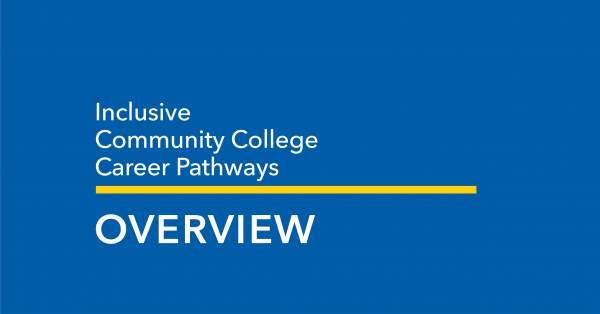Community college can be a path to employment
Preparing individuals with disabilities for the workforce helps states advance their disability employment goals. Community colleges play a critical role in connecting individuals with disabilities to in-demand careers. In 2017, 24.3% of people with disabilities who had completed some college (including earning an associate’s degree) were employed, compared to 16.7% of people with disabilities who had only a high school diploma.
There is room for improvement
Despite the advantages of community college, only 37% of students with disabilities who enroll in 2-year institutions ever receive a degree or credential.
Two Pathway projects
To improve community college outcomes for people with disabilities, the U.S. Department of Labor’s Office of Disability Employment Policy (ODEP) funded two five-year Community College Pathways to Careers demonstration grants. The projects, conducted at Onondaga Community College in New York and Pellissippi State Community College in Tennessee, were designed to test approaches to providing integrated academic and career supports to students with disabilities.
Supported by research
Research identified a number of promising policies and practices that improve community college outcomes for individuals with disabilities. Consistent with this research, the two Pathways projects implemented wide-ranging, intensive, and coordinated approaches to support students with disabilities. The projects provided programs to prepare students for their transitions to college, as well as individualized academic support services. These projects also trained faculty and career services staff on universal design and improved campus environments to make them more accessible.
Positive results
Students who participated in the Pathway projects improved their academic outcomes, suggesting that tailored support can enhance the community college success of individuals with disabilities. Retention and graduation rates for program participants were comparable to rates for all students at the colleges and higher than the rates for students with disabilities who did not participate in the programs.
Watch this space
The Center for Advancing Policy on Employment for Youth (CAPE-Youth) is publishing a blog series to discuss key components of the two programs and show how states can apply similar principles to strengthen community college systems and better support individuals with disabilities. Upcoming blogs in this series will provide detailed information on the Pathways projects and the ways that states can apply similar strategies to help individuals with disabilities earn credentials and improve employment outcomes, including:
- Access
- Universal Design for Learning
- COVID-19
- Work-Based Learning
- Career Services

